Can you take nicotine pouches on a plane? Yes, in most cases, you can, but the rules surrounding airports, security checks, and international borders mean it’s definitely worth understanding exactly what to expect before you fly. This guide walks you through everything: where to pack them, how UK and international airlines treat nicotine products, what customs officers look for, and the laws that apply when you land abroad.
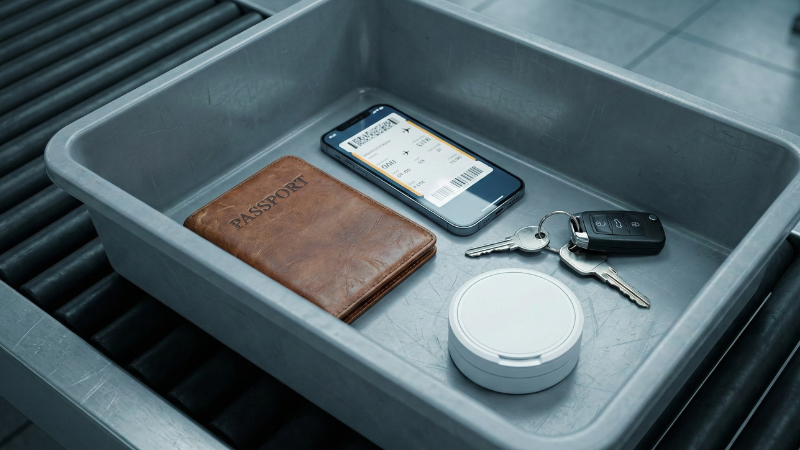
Yes, nicotine pouches are allowed on planes for UK travellers. The UK Civil Aviation Authority treats tobacco-free nicotine pouches as solid, smokeless products so that you can pack them in your hand luggage or your checked bag without any special restrictions. They aren’t treated like e-liquids and aren’t affected by the 100 ml liquid rule.
For international flights, the approach is similar. The TSA in the United States also permits nicotine pouches in both carry-on and checked bags. These permissions apply to nicotine pouches only, not traditional tobacco snus, which may be restricted or banned in some countries.
You must still follow age restrictions when travelling (18+ in the UK, 21+ in some destinations), and laws can change, so checking your airline’s and destination’s guidance before you fly is always the safest approach.
If you need a refresher on what are nicotine pouches, you can read the full guide.
No, nicotine pouches do not count as liquids, either in the UK or under TSA rules. You don’t need to place them in a liquid bag, and they won’t be treated like vape juice or e-liquid during screening.
To make security checks simple, keep teep them in their original tins or boxes so security staff can recognise them quickly if they need to inspect your bag.
Yes, UK airport security allows nicotine pouches in hand luggage for personal use. Your bag simply goes through the regular X-ray scanner, and officers may ask what the product is if it isn’t clearly labelled.
UK airports tend to move quickly, so the most straightforward approach is to keep your pouches together in one place, rather than spreading them across pockets or separate bags. If an officer does need to check them, having everything stored neatly makes the process faster and avoids extra screening.
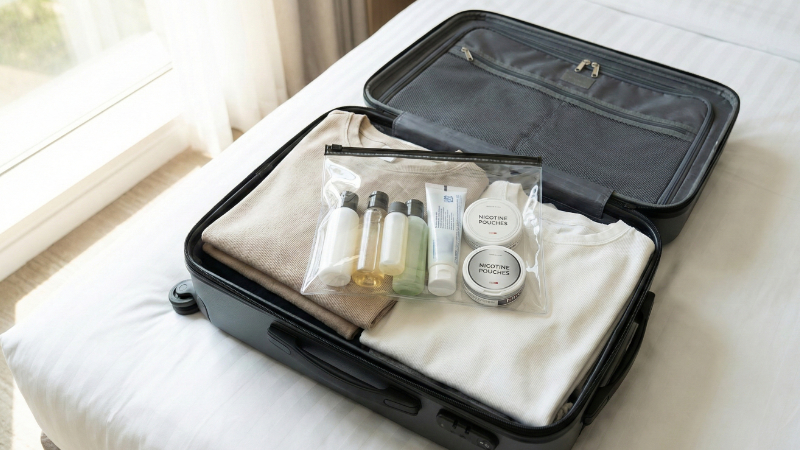
When deciding where to pack your nicotine pouches on a plane, think about how you travel. Both the UK Civil Aviation Authority and the TSA allow pouches in hand luggage and checked baggage, but your experience depends on where you choose to store them.
Most adult travellers prefer keeping their main supply in their carry-on so they always know where it is and nothing gets lost if an airline delays their checked bags. Packing a couple of spare tins in your suitcase can help on longer trips, but the pouches you rely on most are usually better kept with you.
Yes, you can take nicotine pouches in your hand luggage without any issues. Keeping them in your carry-on makes them easier to reach during a long journey and avoids the worry of losing them if a checked bag is delayed or lost.
Yes, you can put nicotine pouches in checked-in hold luggage, and many travellers do this when carrying a larger supply. Just remember the risk: bags can be misplaced or arrive late, so avoid storing everything in your suitcase. Customs inspections can also apply to checked bags, so it helps to keep labels visible and avoid repacked containers.
Most airlines don’t set a specific limit on how many nicotine pouches you can take on a plane. Because they’re a solid, smokeless product, you’re generally free to pack enough for your trip without breaching airline rules. The fundamental limitation usually comes from customs and local nicotine laws in the country you’re flying to, not the flight itself. For example, from April 1, 2026, nicotine pouches, gums, and pearls will be banned in France.
However, currently, travellers can carry a reasonable personal amount, sufficient for the duration of the journey, but not so much that it appears to be commercial stock. Large quantities can raise questions at customs, especially in countries with strict rules on nicotine imports. Some destinations cap the amount of tobacco or nicotine you can bring in, while others restrict specific strengths or brands.
Checking the rules for both your destination and any transit countries helps you avoid delays, confiscations, or awkward questions when you land.
In many countries, you do not need to declare nicotine pouches if you’re carrying a small personal amount. However, customs rules differ widely, and some destinations expect travellers to declare any nicotine products, even if they’re tobacco-free.
If you’re carrying a larger supply or visiting a country known for stricter nicotine regulations, it’s safer to declare them. When unsure, check the official customs website or your destination’s embassy before you fly.
If a country bans nicotine pouches or limits the strength or type you’re carrying, customs officers may confiscate them on arrival. In countries with strict enforcement, such as Singapore or Thailand, travellers can face fines and, in rare cases, further action if they breach local laws.
This isn’t legal advice, but general guidance: always check the rules before travelling and avoid carrying products that your destination prohibits.

When flying with nicotine pouches, most airlines allow you to carry them on board, but each carrier sets its own rules on whether you can use them during the flight. So, a traveller asking “Can you bring nicotine pouches on a plane UK?” will usually get a straightforward yes, but whether you’re allowed to use a pouch mid-flight depends entirely on the airline’s conduct policy. Because these policies can change, it’s always advisable to check the latest guidance before you travel.
Below is an overview of how major UK, European, US, Middle Eastern, and Asian airlines treat nicotine pouches, including whether they permit in-flight use.
UK and European airlines generally follow the same rule: you can bring nicotine pouches on board, but using them may fall under each airline’s broader policy on smokeless nicotine products. Carrying them on board in your hand luggage is fine; however, actually using them during your flight varies from airline to airline.
Here is a simple reference table for key UK and EU airlines:
UK & EU Airline Rules for Nicotine Pouches
| Airline | Can You Bring Pouches? | In-Flight Use Policy | Notes |
|---|---|---|---|
| EasyJet | Yes | Not officially permitted | No vaping; policies may change |
| Ryanair | Yes | Generally not allowed | Often groups pouches with smokeless tobacco |
| Jet2 | Yes | Not permitted | Clear ban on smokeless tobacco products |
| British Airways | Yes | Discretion varies | Ask crew if unsure; no vaping |
| Virgin Atlantic | Yes | Usually not permitted | Applies tobacco rules to nicotine products |
US airlines such as Delta, American, United, Southwest, and Alaska generally allow passengers to carry nicotine pouches on board in both hand luggage and checked baggage. However, many of these carriers treat pouches the same way they treat smokeless tobacco, meaning in-flight use is often prohibited even if possession is allowed.
For travellers heading to the Middle East or Asia, rules can be stricter. Airlines based in regions with tighter nicotine laws, including Emirates, Qatar Airways, Etihad, Singapore Airlines, and some carriers in Southeast Asia, may restrict both the use and, in some cases, the import of nicotine products depending on destination laws.
Because airline rules often overlap with national regulations, the safest approach is to check your carrier’s FAQ or onboard conduct policy before flying. Checking these details in advance helps you avoid misunderstandings, especially when travelling through countries with strict nicotine rules.
Travelling abroad with nicotine pouches is straightforward in some countries and tightly controlled in others. While you can usually pack them in your luggage without issues, the bigger question is whether they are legal when you reach your destination.
Regulations vary widely, and many countries treat nicotine products differently from the UK, especially when it comes to strength limits, import rules, and the distinction between tobacco snus and tobacco-free nicotine pouches.
Europe is a mixed landscape. Traditional snus, which contains tobacco, is banned in most EU countries, with Sweden and Norway being notable exceptions. Tobacco-free nicotine pouches sit in a different category and are not covered by the EU Tobacco Products Directive, meaning each member state sets its own rules.
Some countries allow nicotine pouches without any restrictions. Others have introduced new regulations:
For UK travellers, nicotine pouches remain legal for personal use for adults 18+, but once you enter the EU, the rules depend on local law rather than a single European policy. As legislation is constantly evolving, always check for the most recent updates before your trip.
North America is relatively pouch-friendly, though each country has its own nuances.
Canada has product strength rules and may restrict imports that exceed locally approved nicotine levels. If you bring stronger pouches purchased abroad, customs officers can seize them.
The USA widely sells tobacco-free pouches, and they’re legal in all states. However, imported products still need to comply with US rules on nicotine labelling and age restrictions. Travellers often bring their own supplies without issues, but it’s worth checking whether your destination state has local limits.
Australia is the strictest in this group. Many nicotine products require a prescription, even if they contain no tobacco. Australia’s prescription rules apply to many vaping products and, increasingly, to some nicotine pouch formats as well. Travellers should check official government guidance before packing anything nicotine-related.
This region has some of the most burdensome nicotine regulations in the world. While a few destinations allow personal-use quantities, many impose bans or strong controls:
Tourists are not automatically exempt, even when carrying sealed products for personal use. If you are flying into a country where rules are unclear, check the latest embassy or government travel pages before departure. Fines or confiscation can occur even for small amounts.
Snus and nicotine pouches may look similar, but they’re regulated very differently. Snus contains tobacco, which is why many bans specifically target it, rather than modern tobacco-free pouches. However, border officers do not always distinguish between the two on sight. For that reason:
Following these steps reduces the chance of confusion at the border, especially in countries that ban snus but allow tobacco-free nicotine pouches.
Using nicotine pouches while travelling is less about security rules and more about how each airline and airport expects passengers to behave. Even though pouches don’t produce smoke or vapour, carriers and terminals apply their own conduct policies, and some may restrict use during boarding or takeoff. It’s best to stay discreet, follow crew instructions, and dispose of used pouches in a bin rather than leaving them in seat pockets.
If you want a quick refresher on how to use nicotine pouches, read the guide.
Airlines set clear expectations for how nicotine products should be used on board, even when the rules don’t mention pouches specifically. Because cabin environments are shared, some carriers take a cautious approach and limit in-flight use entirely. If you're unsure, ask a member of cabin crew before using one. They’ll confirm the policy and help avoid any misunderstandings with nearby passengers.
Airports often treat nicotine pouches more flexibly than smoking or vaping, but each terminal has its own guidelines. Some areas prefer passengers to use pouches away from food counters or security lanes to prevent confusion. General seating areas, lounges, and quiet zones are usually more suitable unless signs say otherwise.
Used pouches should always go in a bin. Most tins include a lid compartment for temporary storage, or you can wrap the pouch in a tissue until you reach a rubbish point. Avoid placing used pouches on seats, trays, or in seat pockets, as this can cause hygiene issues and is often flagged by cabin crew.
Keeping disposal tidy is part of being a considerate traveller and helps maintain a positive impression for all nicotine pouch users.
When you’re travelling, the rules around nicotine products vary depending on what you use. Nicotine pouches are simple to pack because they’re solid, don’t leak, and aren’t affected by liquid limits. Vapes and vape juice require more planning, and cigarettes are often subject to import limits and strict smoking rules at airports and onboard.
Many readers ask, “Can you travel with a vape or nicotine pouches?” or “Why are snus and nicotine pouches easier to travel with than cigarettes or vapes?” The differences usually come down to baggage rules, liquid restrictions, and how airlines handle batteries or tobacco products.
For a full breakdown on vape rules, see can you take vapes on a plane.
Packing rules for nicotine products vary depending on what you use. Some nicotine pouches are easy to travel with, while others have restrictions due to battery, liquid, or tobacco content.
The following table provides a clear, at-a-glance guide to help you plan your trip and avoid surprises during security checks or when dropping off your baggage.
| Product Type | Checked Bag? | Hand Luggage? | Special Rules |
|---|---|---|---|
| Nicotine Pouches | Yes | Yes | No liquid limits; keep clearly labelled |
| Vape Device | No | Yes | Batteries must stay in hand luggage only |
| E-liquid | Yes | Yes (100 ml max per bottle) | Must go in a liquids bag at security |
| Cigarettes | Yes | Yes | Import limits vary; smoking is banned on flights |
Nicotine pouches can be a practical option on flights where vaping isn’t permitted. They don’t require batteries, produce no vapour, and fit within airline rules more easily.
Some adult smokers use pouches during long flights simply because they comply with airline restrictions, not because they’re better or safer. The best choice depends on what fits your airline’s rules and your own preferences as an adult nicotine user.
Storing nicotine pouches for a trip is mostly about keeping them organised and protected, so they stay fresh and easy to reach when you need them. Your luggage is handled differently at each stage of a journey, so planning where each tin goes helps avoid damage, delays, or unnecessary rummaging in the middle of a flight.
Hand luggage is the easiest place to keep the pouches you’ll use during the journey. Most travellers store them in their day bag or backpack, where they stay protected and are easily accessible. Keeping pouches in their original tins stops them from being crushed by other items and helps them stay fresh throughout the trip.
If you think you’ll want a pouch mid-flight, keep the tin in a small pocket or the front section of your bag. That way, you can reach it without unpacking half your belongings, leaning over other passengers, or blocking the aisle while the cabin is busy. A simple, tidy spot in your hand luggage keeps everything discreet and avoids any fuss.
Checked luggage is ideal for keeping spare tins you won’t need until later in your trip. To prevent them from being dented during baggage handling, tuck them inside soft items such as clothing or a toiletry bag. The extra padding protects the tins without taking up any additional space.
Because checked bags can be opened for routine inspection, keep the labels visible and avoid repacking pouches into unmarked containers. Using clear, original packaging helps airport staff identify the product quickly if they need to inspect your suitcase.
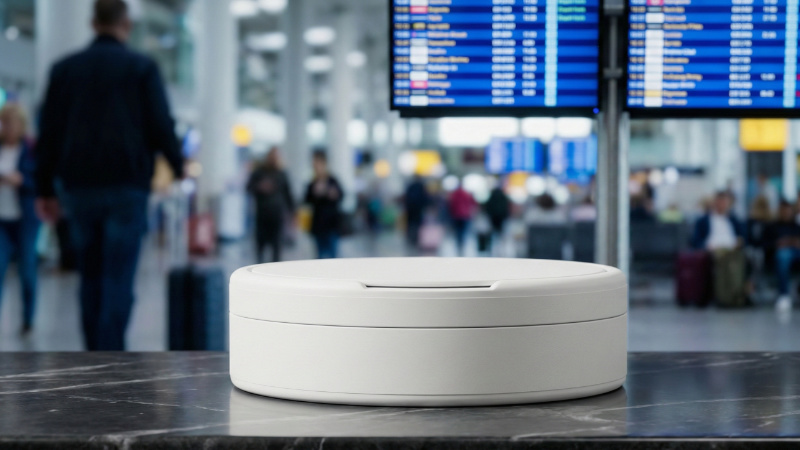
For many travellers, the final check before leaving home is wondering whether they can pick up nicotine pouches at the airport. UK airports and many major international hubs do sell them, but availability varies more than people expect. Some terminals stock a limited range in duty-free or newsagents, while others offer only one or two brands, often in limited strengths. Because of this, it’s usually best to bring enough for your whole trip rather than relying on airport shelves.
You can buy nicotine pouches in several major UK airports, including Heathrow, Gatwick, Luton, Stansted, Manchester, and Birmingham. Availability depends on the retailers inside each terminal. Larger shops such as WHSmith, duty-free outlets, and travel convenience stores sometimes stock a small range, usually focusing on well-known brands and popular strengths.
Some terminals carry only one or two options, while others may not sell nicotine pouches at all. Because stock isn’t guaranteed, many adult travellers prefer to buy their preferred tins before arriving at the airport.
Because availability is inconsistent, most travellers choose to buy enough pouches before reaching the airport to avoid running out mid-journey.
Once you land, accessibility largely depends on local laws and regulations. In Scandinavia, parts of the EU, and much of North America, nicotine pouches are widely available in everyday retail spaces, including supermarkets, kiosks, petrol stations, and local convenience stores. The choice is usually broad, with a mix of brands and strengths.
In contrast, some countries have bans or strict import rules. In parts of Asia, the Middle East, and certain EU countries, nicotine pouches may be restricted, sold only in speciality shops, or unavailable altogether. To avoid surprises, check local regulations and look up authorised retailers before you travel.
If you’re wondering “What should I do before travelling with nicotine pouches?” or whether “carrying nicotine pouches when travelling is easy or difficult,” this simple checklist covers the essentials. It consolidates the key points from the guide, enabling you to travel confidently and stay prepared at every stage of your journey.
Nicotine pouches contain nicotine, and adults who already smoke or use nicotine should be the only people using them. These products support adult smokers looking for a nicotine alternative, but they are not risk-free and never suitable for anyone under the age of 18.
Vape and Go provides TPD-compliant products with fast UK delivery and offers clear, responsible guidance to help adult customers choose nicotine alternatives confidently.
Whether you’re flying for the first time with nicotine pouches or just need quick reminders, these FAQs cover the questions travellers ask most. Each answer is concise, clear, and based on current UK and international travel regulations, allowing you to plan with confidence.
Yes, you can take nicotine pouches on most flights. They’re treated as solid, smokeless products and can go in both hand luggage and checked bags. Always check your airline’s rules and destination laws before travelling.
Yes, UK airlines allow you to bring nicotine pouches on board. However, each carrier sets its own policy on in-flight use. Check the guidelines of EasyJet, Ryanair, or Jet2 if you’re unsure, as rules are subject to change.
Airlines rarely set quantity limits. The bigger factor is your destination’s import rules, which may restrict nicotine products. Carry a sensible personal amount and check local regulations before flying to avoid any issues upon arrival.
No, nicotine pouches do not count as liquids. They can stay in your hand luggage without needing to be placed in a 100ml liquids bag. Keeping them in their original packaging helps with quick security checks.
Some airlines allow discreet use, while others restrict all nicotine products. If you’re unsure, ask the cabin crew before using a pouch. Their guidance always takes priority during the flight.
Small personal amounts are usually not required to be declared, but the rules vary by country. If you’re carrying more than a personal supply or travelling somewhere with strict regulations, declaring them is the safer option.
Nicotine pouches are generally permitted. Snus may be allowed on board, but can be restricted or banned in many countries because it contains tobacco. Check local laws before travelling with either product.
Yes, but legality varies widely by region. Some countries allow them freely, while others restrict imports or ban them entirely. Always check the latest laws for your destination and any transit countries.

Salman Essap is the founder and CEO of Vape and Go, a leading online retailer of high-quality vaping products and accessories. Alongside his crucial involvement in the company, he is passionate about vaping and is committed to helping others switch from harmful tobacco products to safer alternatives. Salman is an expert in the vaping industry and has extensive knowledge of the latest trends, technologies, and innovations.
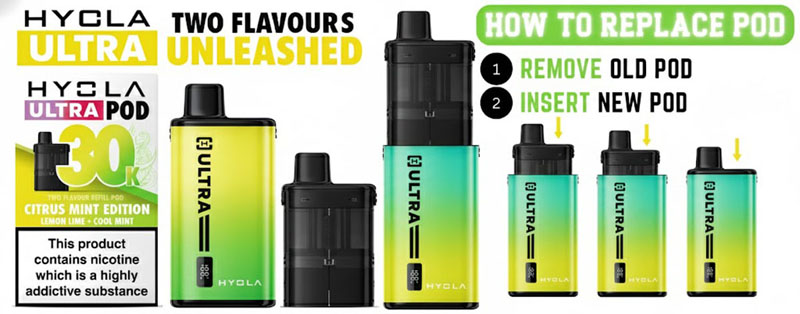
People are talking about the Hyola Ultra 30k because it quietly makes sense. Not because it is flashy or trying to be different, but because it lines up with how most people actually vape now. A lot of users are tired of buying disposables over and over again, but they also do not want something complicated. They want the same ease, just with more life in it. That is where this kit fits in.
Another big reason is trust. Vapers are starting to care less about features and more about whether a device stays consistent. They want the flavour to taste the same after a week as it did on day one. They want the draw to feel familiar every time. The Hyola Ultra 30k keeps things simple and does not try to do too much, which is why it keeps coming up in everyday conversations.
Published on 21-01-2026 05:47 AM by parthshah Seo

The UK vape market has shifted in a big way this year. With disposables slowly being phased out and pod systems becoming smarter, stronger and far more flavour-focused, 2026 has quickly become the year of the vape pods. What started as a convenient alternative has now turned into the go-to option for vapers who want better value, better flavour and a device they can rely on every single day.
Thanks to major improvements in coil technology, battery performance and pod design, today’s vape kits can deliver the same satisfying flavour that made disposables so popular, but with cleaner performance and much lower running costs. Whether you prefer something simple and prefilled or a refillable device you can personalise, brands like Vaporess pods, OXVA pods, Elf Bar pods, SKE, and Hayati pods, IVG have all stepped up with impressive releases this year.
So whether you’re switching away from disposables, starting your vaping journey or just looking for an upgrade, the 2026 lineup has something for every style and preference. In this guide, we break down the best vape pods in the UK right now, what makes them stand out, and how to find the one that suits you best.
Published on 17-12-2025 05:29 AM by Vape And Go

The UK vape market has shifted in a noticeable way this year. With disposables being phased out and brands pushing harder than ever on flavour quality, battery performance and overall design, 2025 has become a standout year for vape kits. The latest devices feel more refined, more consistent and far better suited for everyday use, giving vapers a level of reliability that simply wasn’t there before.
What makes this year especially interesting is how different brands have approached their upgrades. Some, like Hayati, Elux, Elf Bar and SKE Crystal, have taken the bold, sweet flavours people loved in disposables and built proper reusable kits around them. Others, Vaporesso, OXVA, Hyola, and Aspire, have focused on stronger coil technology, smoother airflow and premium build quality for users who want something more advanced. IVG sits comfortably in the middle, offering clean flavour and stable performance without leaning too far in either direction.
Whether you’re switching from disposables, looking for a more reliable daily kit or simply ready for something that delivers better flavour and battery life, 2026 offers more good choices than ever. Let’s go through the top vape kits of 2026 and see what each one brings to the table so you can find the one that feels right for you.
Published on 17-12-2025 05:19 AM by Vape And Go
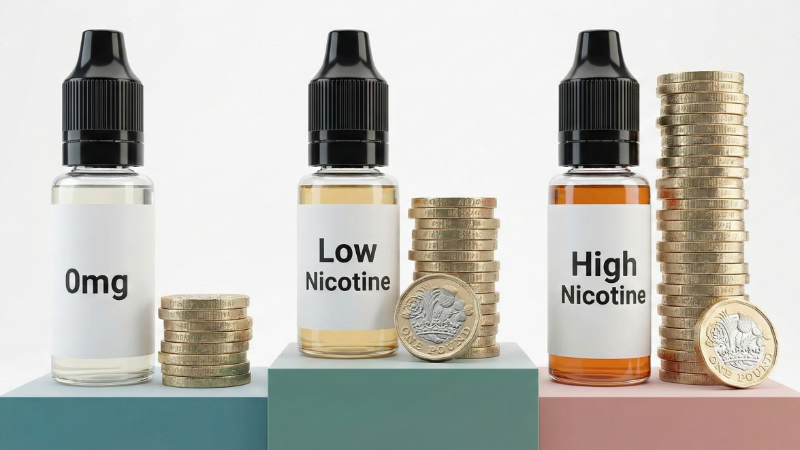
The UK vape tax 2026 starts on 1 October 2026 and introduces a new excise duty, the Vaping Products Duty, on vape liquids sold in the UK. It applies to nicotine and nicotine-free liquids, including bottled e-liquids and the liquid inside prefilled pods.
The key point is simple: this duty is not based on nicotine strength. HMRC’s published approach is a flat rate per millilitre, so the total duty in the price depends on how many ml you buy, not whether the liquid is 0mg or contains nicotine.
This guide from Vape and Go explains how the duty works, shows clear volume-based examples, and includes a practical cost calculator and compliance checklist so adult customers know what to expect.
Published on 07-12-2025 10:34 AM by Vape And Go